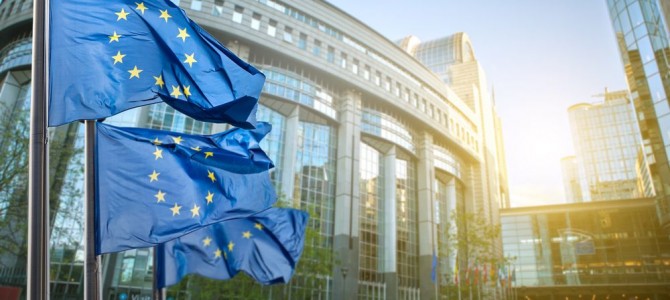
As an international relations theorist, it always baffled me that no one in the United States took the threat of European Union–U.S. confrontation seriously. There were no plans in either major party, not many serious research papers even dealing with this topic of an unlikely, but nevertheless, potential conflict of interest between two trade giants, one a slowly transforming empire, and another the undisputed hegemon of the Western hemisphere.
The lack of research or coverage in media is perhaps reflective of the complacent ideological conformity, or the liberal institutionalist bias in Western media and academia, but that’s a topic for a separate post. As of now, the U.S. and EU are heading for a full-blown trade war, and it was a long time coming. Fortunately for the U.S., the private sector created 235,000 new jobs in February, thousands more than the predicted 195,000. There’s evidence that US Steel is rehiring people in factories. The U.S. domestic labor market remains robust for now.
European Council President, Donald Tusk warned the U.S. that the EU would retaliate with proportional measures against U.S. tariffs on steel and aluminum. Tusk is under intense pressure in his native Poland, under the current Polish government, a strong ally of the United States. It made me wonder, what if tomorrow the U.S. declared that American troops won’t be stationed east of Danube anymore? Will the East and Central Europeans tear the EU apart?
It is unlikely Belgium and Germany will provide the security umbrella and nuclear deterrence that the U.S. currently provides to these vulnerable countries under threat of Russian interference. The other person who rallied against U.S. tariffs is Cecilia Malmstrom of Sweden. “Certain types of bourbon are on the list, as are other items such as peanut butter, cranberries, orange juice. Very soon that list will be public, so you will be able to plan your whiskey drinking,” she was quoted as saying. It’s no coincidence that the other political union which tariffed consumer goods was the Soviet Union, where tariffs were placed on jeans and food products. There’s also a risk that EU measures will be in violation of WTO rules.
Ultimately, however, this was inevitable. The conflict of interest between the EU and the U.S. is not limited to trade, and it was inevitable this would spread out. NATO funding has been a major issue, ever since Bob Gates gave a blistering speech warning that future American leaders will find it indefensible to lecture American taxpayers if Europe keeps on increasing social spending and expecting Americans to pay for security. That warning was repeated by Chuck Hagel and Ash Carter, to no effect, until Trump came. However, Europe didn’t learn the lesson and continued to duplicate NATO in another security infrastructure which displeased the Pentagon. Again, it came as a shock to planners in the U.S., but it shouldn’t have.
The fundamental geostrategic threat to Western Europe disappeared with the collapse of the Soviet Union, and NATO became obsolete in its current form. Trump, or any future American leader, will not be able to make Western European countries pay their full share in NATO.
Likewise, in trade, the EU has consistently fined American companies. In 2016, EU commissars fined Apple a whopping 13 billion euros for investing in Ireland. Apple warned then that future trade investment in the EU would be jeopardized if such punitive anti-trade measures continue. Undeterred, EU fined Google 2.4 billion euros in 2017 for allegedly manipulating search engine results. If one goes back to the 1990s, the amount of fines imposed on companies exceeds 26.75 billion euros. One wouldn’t be wrong to think that the amount of punitive action against American companies by the EU is political and ideological, rather than purely economic.
The two questions, therefore, are, in the eventuality of an actual trade war, where would the escalation lead? Is the EU interested in genuinely angering the majority of American taxpayers who still pay for EU security, by putting tariffs on consumer goods like jeans and juices? And the second question is, in the unlikely event of such an escalating confrontation, are all Americans firmly behind their government and country?
It is past time for bipartisan American policymakers to acknowledge that the U.S. and the EU are divided on issues, some of which were inevitable. The structural realities of Europe in 1945, or even 1989 are not the same, and they cannot be the same, simply because the EU is inexorably expanding eastward. It is an empire in the making rather than an economic, or even a political union, and naturally commensurate with that the EU is supposed to have an independent foreign policy, political ideology (liberal internationalism) to export and possibly in the future an independent military force. It will also, just like any other empire, have internal ideological dissent, which it will choose to crush either through coercion or economic force, and will also naturally come in confrontation with other major powers, and that includes the United States.
The EU policy with regards to Iran, Jerusalem, Russian sanctions, Nord Stream, Ukraine and Chinese One Belt One Road is already at odds with the broader American interests. It will only continue to increase, and sooner rather than later, American policymakers will be forced to adjust to that new structural reality.









